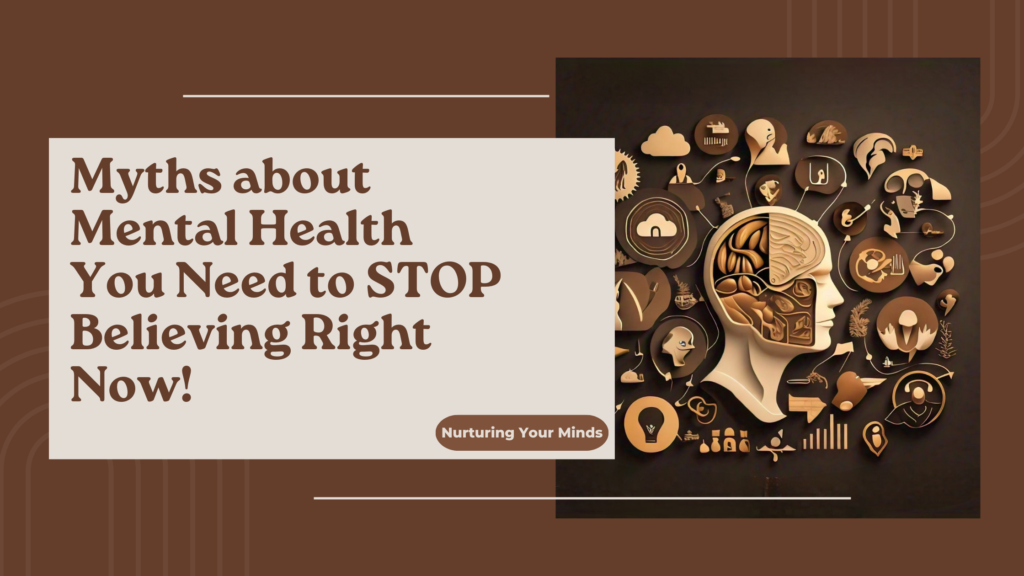What if I told you that everything you’ve heard about therapy is probably wrong? Get ready to challenge your beliefs and uncover the truth about mental health and psychotherapy!
Mental health is not a destination, but a process; it’s about how you drive, not where you’re going. Yet, too many are stuck in traffic, believing myths that hold them back from reaching their true potential.”
Introduction: Myths about Mental Health
In a world where mental health is increasingly coming to the forefront, it is astonishing how many myths about mental health and therapy still exist. We often hear whispers of misconceptions that paint a misleading picture, causing many to shy away from seeking help. Today, we’re breaking the silence and confronting these common myths about mental health. Let’s unravel the myths and facts about mental health and therapy, and uncover the truth that has the power to transform lives.
Myth #1: “Therapy Is Only for ‘Crazy’ People”
One of the most persistent myths about therapy is that it is only for people who have “serious” mental illnesses or are “crazy.” This myth couldn’t be further from the truth. In reality, therapy is for everyone; those struggling with mental health challenges, and those simply seeking to improve their lives.
Fact Check
Therapy is a valuable tool for anyone who wants to understand themselves better, navigate difficult emotions, or build healthier relationships. Just as we visit a doctor for physical check-ups, therapy offers a safe space to explore our mental and emotional well-being.
Why This Myth Persists
The stigma surrounding mental health is deeply rooted in society, often perpetuated by a lack of understanding. People fear being labeled or judged, which prevents them from seeking the help they need. The truth is, therapy is about growth, healing, and becoming the best version of oneself.
Therapeutic courses can also be a helpful source in trying to achieve your mental well-being, if you can not be consistent and take therapy sessions for a longer period of time.
Myth #2: “Talking to Friends Is the Same as Therapy”
Another common myth about mental health suggests that talking to friends or family is just as effective as speaking with a professional therapist. While having a strong support network is important, therapy offers something distinctly different.
Fact Check
A trained therapist provides a non-judgmental, unbiased, and confidential environment. They use evidence-based techniques to help clients identify patterns, understand their feelings, and develop coping strategies. Unlike friends, therapists are professionals who can provide tools for deep, lasting change.
Why This Myth Persists
Many people believe that therapy is simply about “venting” or sharing problems. However, therapy goes beyond talking; it involves structured techniques, therapeutic interventions, and psychological expertise that friends and family are not equipped to provide.
Myth #3: “Therapy Is Only for People Who Are Weak”
This myth feeds into the harmful stereotype that seeking help is a sign of weakness. In reality, choosing to engage in therapy is an act of immense courage and strength.
Fact Check
Seeking therapy shows a willingness to confront difficult emotions and situations. It takes courage to face one’s innermost fears, traumas, and struggles. Therapy helps people develop resilience, coping skills, and emotional intelligence, which are signs of strength, not weakness.
Why This Myth Persists
Society often celebrates physical strength and resilience while neglecting emotional and mental resilience. This myth is perpetuated by the misconception that mental health struggles are a sign of personal failure, rather than a natural part of being human.
Myth #4: “Therapy Takes Forever and Never Ends”
A prevalent myth about therapy is that it is a never-ending process that drains time and money. This belief prevents many from seeking the help they need, fearing they will be stuck in therapy indefinitely.
Fact Check
The duration of therapy depends on individual needs and goals. While some people may benefit from long-term therapy, many find resolution in a few sessions. Cognitive Behavioral Therapy (CBT), for example, is often structured to be short-term, with a clear focus on specific issues and outcomes.
One time Therapeutic courses can also be a helpful source in trying to achieve your mental well-being, if you can not be consistent and take therapy sessions for a longer period of time.
Why This Myth Persists
Pop culture often portrays therapy as a drawn-out, endless process, but this is far from the truth. In reality, therapy is highly personalized and goal-oriented. Therapists work with clients to determine the best approach and timeframe that fits their unique situation.
Myth #5: “Mental Health Problems Are Rare and Uncommon”
Many people believe that mental health issues are rare or only affect certain types of people. This myth fosters a sense of shame and isolation for those experiencing challenges.
Fact Check
According to the World Health Organization (WHO), one in four people globally will experience a mental health issue at some point in their lives. Mental health conditions like anxiety, depression, and stress are incredibly common and affect people from all walks of life.
Why This Myth Persists
The myth that mental health issues are rare is perpetuated by a lack of open conversation and representation in media. Many suffer in silence, feeling like they are the only ones struggling, which only reinforces the stigma.
Myth #6: “Medication Is Always Necessary in Therapy”
A misconception often associated with therapy is the belief that medication is always a part of treatment. While medication can be a helpful tool for some, it is not a requirement for everyone.
Fact Check
Therapy can be highly effective without medication. Many therapeutic approaches, such as Cognitive Behavioral Therapy (CBT), Dialectical Behavior Therapy (DBT), and mindfulness practices, do not rely on medication. Therapy focuses on developing skills and strategies to manage emotions and challenges, which can often be effective on their own.
Why This Myth Persists
The medical model of mental health often emphasizes medication, but therapy provides a wide range of approaches tailored to each individual’s needs. This myth discourages those who fear medication from seeking therapy, not realizing there are many non-medication options available.
Myth #7: “Once You Start Therapy, You’ll Become Dependent”
The fear of becoming dependent on therapy is another myth that discourages people from seeking help. There is a misconception that once you start therapy, you won’t be able to cope on your own again.
Fact Check
The goal of therapy is to empower individuals to handle their challenges independently. Therapists work with clients to build skills, resilience, and self-sufficiency. Most therapists aim to work themselves out of a job by equipping clients with the tools they need to thrive on their own.
Why This Myth Persists
Misunderstandings about the therapeutic process can make people feel that therapy creates dependency. In truth, therapy is designed to be a temporary support that fosters long-term independence and well-being.
Myth #8: “Therapy Is Just for Talking; It Doesn’t Lead to Real Change”
A prevalent myth suggests that therapy is merely a “talk session” without tangible results. This myth minimizes the value of psychotherapy and the real-life changes it can facilitate.
Fact Check
Therapy is not just about talking; it involves actionable steps and techniques that promote real, lasting change. It addresses the root causes of problems, helping individuals make meaningful life changes. Studies consistently show that therapy can be as effective as medication for many conditions, with benefits that last longer.
Why This Myth Persists
The therapeutic process can be hard to visualize without firsthand experience. It’s easy to assume that talking doesn’t lead to change, but those who engage in therapy often find that it provides profound insight, clarity, and transformation.
Myth #9: “All Therapists Are the Same”
People often believe that all therapists offer the same kind of treatment, leading to a misunderstanding about the variety of therapeutic approaches available.
Fact Check
Therapists come from various educational backgrounds and employ different methods such as cognitive-behavioral therapy, psychodynamic therapy, humanistic therapy, and more. Each type of therapy offers unique benefits, tailored to meet the specific needs of clients.
Why This Myth Persists
The myth that all therapists are the same comes from a lack of awareness about the diversity within the field of psychotherapy. Finding the right therapist and approach is crucial to effective treatment.

Conclusion: Dispelling Myths, Empowering Minds
It’s time to break free from the myths that keep us from prioritizing our mental health. The myths about mental health and therapy have caused unnecessary fear, stigma, and misunderstanding for far too long. By debunking these misconceptions, we open the door to healing, growth, and a better understanding of ourselves and others.
Remember: Seeking therapy is not a sign of weakness, but a courageous step toward self-improvement and empowerment. The truth about therapy and mental health is that they are for everyone, at any stage of life.
Call to Action
If you’ve been holding back from seeking help because of these myths, consider reaching out to a mental health professional. You deserve to live a life filled with clarity, peace, and understanding, and therapy might just be the key to unlocking that future.



